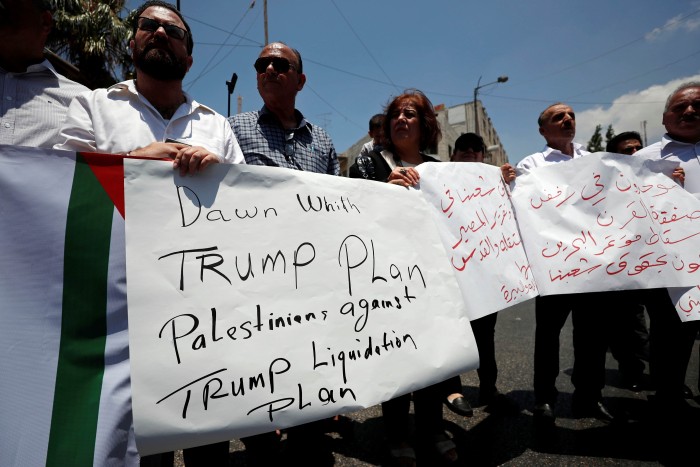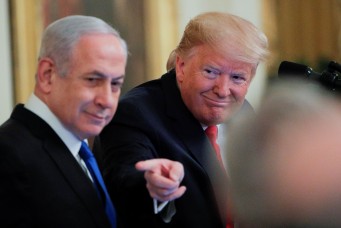Kushner’s New Plan for Palestine
The “Deal of the Century” is quickly shaping up to be the “Deception of the Century” and here’s why.

Palestinians hold signs during a protest against the U.S.-led economic workshop for Mideast plan that is hosted by Bahrain, in Ramallah in the Israeli occupied West Bank, June 15, 2019. Mohamad Torokman/Reuters
Finally, the economic portion of the Donald Trump administration’s “Deal of the Century” has been launched by Trump’s advisor and son-in-law Jared Kushner at a workshop in Manama, Bahrain. Called “Peace to Prosperity: A New Vision for the Palestinian People and the Broader Middle East,” it is worth some $50 billion, with $28 billion earmarked for the Palestinian economy, $9 billion for Egypt, $7.5 billion for Jordan, and $6 billion for Lebanon. The economic plan, much of which is not new and requires Israeli support, includes education opportunities, health care, business incentives, and infrastructure improvements. Key in the infrastructure section of the paper is a proposal for a new road, and possibly rail connection, which would for the first time link the West Bank and Gaza and provide territorial contiguity for a future Palestinian state.
The proposal has largely been rejected by the Palestinian leadership and many other governments in the Middle East, who cited that a political solution to end Israel’s occupation was more conducive to peace and economic prosperity than an economic plan. The proposal was widely expected to favor Israeli interests after President Donald Trump announced in December 2017 that the U.S. embassy would move from Tel Aviv to Jerusalem, ended U.S. aid to the Palestinian refugee agency UNRWA in September 2018 (funding to expand access to education to undeserved communities is now back on the table), and unilaterally recognized Israeli sovereignty over the Golan Heights in March 2019.
Donors and the Peace to Prosperity Fund
Some Arab Gulf states, which are expected to be the biggest donors to the proposed new fund and must have already been consulted by the Trump administration, have been more open-minded in their responses. Palestinian distrust of the Trump administration will likely be met with a much greater U.S. emphasis on the coercive capacity of the Arab Gulf states to invest in the scheme and possibly even put political pressure on the Palestinian leadership to accept the deal behind closed doors.
However, it is difficult to envisage how these states will commit to new financing arrangements in an era of lower oil prices and increasing demands being made on their own budgets due to population growth, ongoing diversification plans, and established regional patterns of costly “riyal politik.” Many Arab Gulf states are actively engaging in economic intervention as global financial actors, including development finance, especially across the developing world. This includes the Middle East, notably in Egypt in support of President Abdel Fattah El-Sisi, where assistance amounts to billions of dollars.
While Kushner’s plan recognizes that the conditions for a political solution remain difficult and complex, it appears to ignore principles of international law, political sequencing, and direct negotiation. In the end the plan remains half-baked, with the real work of an implementable political strategy still to come.
Regional Conditions for Peace
The economic plan has drawn comparisons with the U.S. Marshall Plan for Europe post-World War II, which was conceived to remove trade barriers, modernize industry, and prevent the spread of Communism. This in a region which was already experiencing post-war recovery and a relatively stable security environment. While improving cooperation with Egypt, Israel, and Jordan will help the Palestinian economy, none of the plan will be transformative without much improved relations with Israel, which is unlikely given Prime Minister Benjamin Netanyahu’s campaign based on tough diplomacy and a close personal relationship with President Trump. Less still as the Trump administration attempts to implement a maximum-pressure strategy against Iran, which has resulted in a series of escalations in the Gulf. A renewed U.S. partnership with the Palestinian Authority (PA) and UNRWA is also required as both are well-placed to prevent the spread of radicalization among youth.
Arab tensions with states such as Turkey, Iran, and Qatar, which encourage or condone political Islam, is also complicating regional cooperation. Putting that in consideration alongside weak and failing states due to ongoing governance issues, conflict, and other longer-term socioeconomic challenges such as water security, population growth, and climate change make conditions for securing Middle East peace in the near or longer term look remote.
Remaining Political Issues in the Middle East Peace Process
After spending time in Israel and Palestine, I found that a lack of trust and security, which stems from political issues, ongoing disputes over settlements, and the non-resolution of final-status issues, continues to hamper new economic cooperation efforts. Lack of progress and political entrenchment have translated to negative measures being taken on both sides, whether through the activities of the Palestinian Boycott, Divestment and Sanctions (BDS) campaign or reductions of Israel tax transfers to the PA due to alleged militant activity which amounted to $138 million. A lack of political goodwill was found to be more important and yet challenging to overcome than the letter of any agreement. I noted that measures aimed at improving movement and access could be transformative to the Palestinian public. So could increased spending on new communities and making improvements in refugee camps.
When Kushner launches part two—the political plan for Israel/Palestine—he might consider including meaningful references to Palestinian refugees, a settlement freeze, and push for a territorial re-negotiation, including recognizing East Jerusalem as the capital of Palestine. This would probably reinvigorate and fast-track the peace process. It would also show serious intent on the part of the United States and could induce the Palestinian leadership to offer their full support to this plan, including enhancing governance and building institutions that are more responsive to its citizens.
Robert Mason is associate professor and director of the Middle East Studies Center at the American University in Cairo. He is author of Foreign Policy in Iran and Saudi Arabia: Economics and Diplomacy in the Middle East. On Twitter: @Dr_Robert_Mason.
Read More

